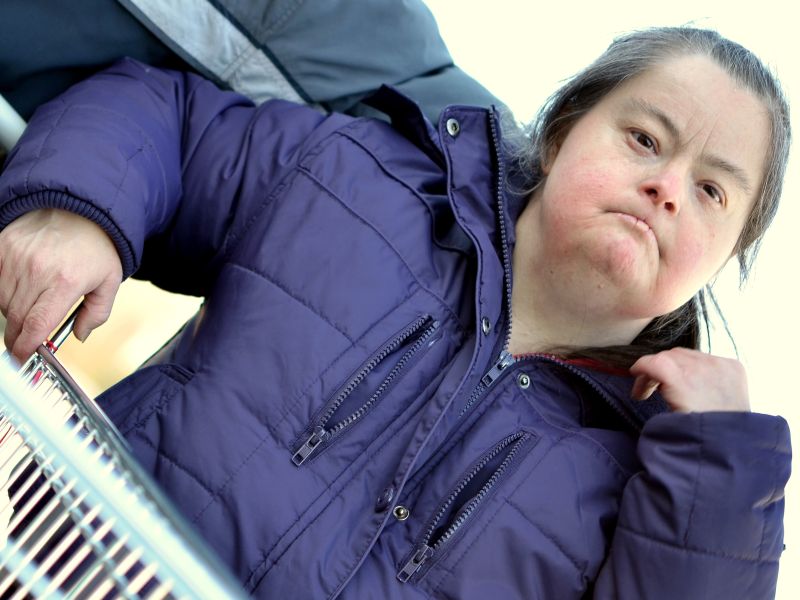Latest Healthy Kids News
 By Amy Norton
By Amy Norton
HealthDay Reporter
TUESDAY, Oct. 27, 2020 (HealthDay News)
When adults with Down syndrome contract COVID-19, their risk of dying is much higher than the norm, a large, new study finds.
The researchers found that of over 8 million British adults, those with Down syndrome were four times more likely to be hospitalized with COVID-19, and 10 times more likely to die due to the infection.
Right now, people with Down syndrome are not included on the list of groups at “high risk” of severe COVID-19. But experts said the new findings show they should be.
Down syndrome is a genetic disorder where people carry a third copy of chromosome 21, instead of just two. It usually causes delays in growth and varying degrees of intellectual impairment. People with the disorder are also prone to certain medical problems — including congenital heart disease and the breathing disorder sleep apnea.
In this study, those conditions explained some of the excess risk among adults with Down syndrome, but not all of it.
Researchers suspect differences in immune system function may be playing a critical role.
“In people with Down syndrome, the immune system is over-reactive,” said Joaquin Espinosa, executive director of the Linda Crnic Institute for Down Syndrome at the University of Colorado Anschutz Medical Campus.
Often, that manifests as autoimmune conditions such as autoimmune thyroid disease, celiac disease and type 1 diabetes. But more broadly, people with Down syndrome have immune system “dysregulation,” explained Espinosa, who was not involved in the new study.
In many cases of severe COVID-19, he noted, it’s believed that an overly aggressive immune reaction — dubbed a cytokine storm — ends up damaging the body’s organs. And, in theory, people with Down syndrome would be more vulnerable to that.
Back in May, Espinosa wrote a commentary published in the journal Cell Reports Medicine arguing that Down syndrome should be considered a risk factor for severe COVID-19.
He said these latest findings provide the hard numbers to support that argument.
The study, published online Oct. 21 in Annals of Internal Medicine, was led by Dr. Julia Hippisley-Cox, of the University of Oxford in the United Kingdom. Her team used a primary care database with information on millions of patients, allowing them to link results from SARS-CoV-2 testing to hospitalization and death records.
Of over 8 million adult primary care patients, 4,053 had Down syndrome. Only a small percentage of patients overall were tested for SARS-CoV-2 during the study period.
But among people who died during that period, COVID-19 was a common cause — especially among those with Down syndrome. Overall, 68 people with the condition died, with 40% of those deaths attributed to COVID-19.
Among people without Down syndrome, there were 41,685 deaths, with 20% attributed to COVID-19, the study found.
Adults with Down syndrome often live in group residences, which could increase their chances of exposure to the coronavirus. But living arrangements, along with medical conditions, explained only part of the higher COVID-19 risks seen in the study.
Hippisley-Cox agreed that immune system dysfunction could be an explanation.
“Younger people with Down syndrome do have a predisposition to viral respiratory tract infections, pneumonias and acute respiratory distress syndrome,” she said. “So, there may be some shared mechanisms here that need closer investigation.”
Because the study included only adults, it’s not clear whether children with Down syndrome face a higher risk of severe COVID-19, relative to other kids.
“Generally, it appears that the risks to children from COVID-19 may be lower [versus adults],” Hippisley-Cox said. “But the exact risks to children with Down syndrome would need to be very carefully examined.”
Espinosa said that people with Down syndrome and their families should be careful about prevention, which includes following social distancing guidelines and wearing masks. And if they do test positive for the infection, he said, they should be carefully monitored and taken to the hospital if breathing problems develop.

Copyright © 2020 HealthDay. All rights reserved.
References
SOURCES: Julia Hippisley-Cox, MD, professor, clinical epidemiology and general practice, University of Oxford, Oxford, U.K.; Joaquin Espinosa, PhD, executive director, Linda Crnic Institute for Down Syndrome, University of Colorado Anschutz Medical Campus; Annals of Internal Medicine,Oct. 21, 2020, online

